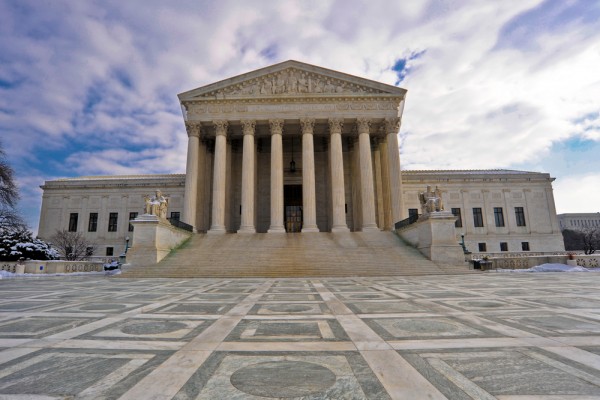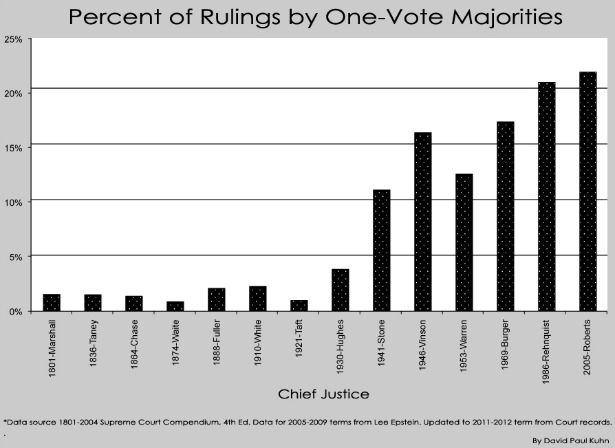Law and Politics Are Inseparable, SCOTUS at Height of 5-4 Decisions

 Rena Schild / Shutterstock.com
Rena Schild / Shutterstock.com
The Supreme Court of the United States of America, under Chief Justice John Roberts, has had its highest percentage of one vote majority decisions than ever before in the court's history.
The Judicial Branch -- at the top of which is the Supreme Court -- is designed to be the most removed government branch from political leanings. Yet, the influx in court decisions made by a one vote majority have raised questions about political influence affecting the rule of law.
The tides of political opinion are bound to turn, but the Supreme Court has a responsibility to operate above such influences.
David Paul Kuhn: The AtlanticThe graph above, compiled by David Paul Kuhn for the Atlantic, shows the upward trend in cases decided by a single vote. The court is at its highest level of one vote decisions under Chief Justice Roberts.
Most 5-4 decisions mirror the political makeup of the court, with five Justices (Roberts, Scalia, Thomas, Kennedy, and Alito) having been appointed by Republican presidents, and four (Ginsburg, Breyer, Sotomayor, and Kagan) appointed by Democrats.
Not every 5-4 decision is a perfect ideological split. The court's decision on the Patient Protection and Affordable Care Act was hailed for its 5-4 split not falling under the strict ideological divisions that were expected. Roberts joined the four justices appointed by Democrats, providing the swing vote based on legal and not political justifications.
However, excitement over this departure from the trend shows that it is the exception, not the rule. The amount of 5-4 decisions in an ideologically 5-4 split court suggests the Supreme Court may not exist in the political safe haven it was designed to thrive.
The design of the Supreme Court, as outlined in Alexander Hamilton’s Federalist Papers, was to shield the justices of political influence. This was achieved through giving justices lifetime tenure, disabling Congress from reducing their salaries, and rejecting legislative veto of court decisions.
Hamilton explained the importance of this separation in stating:
“The complete independence of the courts of justice is peculiarly essential in a limited constitution”“But it is not with a view to infractions of the Constitution only, that the independence of the judges may be an essential safeguard against the effects of occasional ill humors in the society.”
The Political Questions Doctrine is in place to ensure courts avoid encroaching into political territory. The doctrine states that federal courts shall refuse to hear cases which deal with issues that belong solely to the domain of a different branch. However, courts still regularly hear cases that deal with political issues such as abortion, campaign finance, and health care with regards to constitutionality.
The Supreme Court's ideal is to be America’s top nine legal minds working together to determine the will of the constitution. But, the increasing number of decisions that come down to a one person majority shows that law and politics are inseparable.




